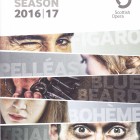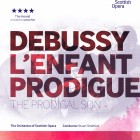Enfant Prodigue 2017Scottish Opera
Read more about the opera Enfant Prodigue
Scottish Opera's Music Director, Stuart Stratford, is largely responsible for an enterprising policy - the use of one-off concert performances to introduce to Scottish audiences works that are scarcely known in these parts.
The second of these involved Debussy's early cantata L'enfant prodigue, composed in 1884 and eventually staged shortly before World War One. The only section even remotely familiar in Scotland was perhaps Lia's Recitative and Air, presented in the Usher Hall at the 1990 Festival, by none other than Montserrat Caballé.
Stuart Stratford's view of the piece was borne out in a fine performance: 'The early works of great composers reveal much about the mature master. Debussy was just 22 years old in 1884 when he submitted L'enfant prodigue for a competition, and yet all of the embryonic elements which we associate with him are present in this piece. His dynamic use of instrumental colour, extended use of exotic scales, and complex and layered textures are all recognisable as belonging to the master musical alchemist.'
While the piece was not intended to be fully staged as an opera, the work is quite well structured and packs a lot of interest into its brief span. A substantial solo of desperation for Lia is curtly dismissed by her husband. Azaël arrives and sings of his disastrous years away, wondering if he will even be recognized, far less forgiven. His mother greets him joyfully, and after his father is also reconciled to his return, the piece ends with a celebratory trio, perhaps owing more to the style of Gounod or Bizet than to Massenet.
The performance certainly made the most of the piece. This was helped enormously by the seriousness of approach of the soloists. No noses were buried in scores here. All three sang convincingly from memory and acted in a simple semi-staged manner that was extremely effective. Claire Rutter was the only singer familiar to the audience, and she created a convincing portrayal of the bereft mother, using her beautiful, dramatic voice to the full. Ashley Holland has rarely worked in Scotland since his student days - he was a member of Scottish Opera's chorus a few years ago now - but it was good to have him back, even in the relatively short role of a stiff, trenchantly-sung father gradually revealing his true feelings. The new tenor, Luis Gomes, revealed a full-blooded lyric voice that should do nicely when he returns for Rodolfo in the spring.
This enterprising concert began with a far more familiar Debussy work, the Prélude à l'après-midi d'un faune. - the mature composer producing a colour palette completely different from, and more advanced than, that of the cantata. There was also a link to the company's forthcoming main stage Debussy production in the Sibelius music for Pelléas et Mélisande, dating from 1905. This includes the 'At the Castle Gate' movement, familiar as the introductory theme for the long-running TV series The Sky at Night. But there is far more to it than that, with several substantial and atmospheric interludes that were well worth an airing.
These purely orchestral works also allowed Stuart Stratford to put the players through their paces in an exemplary display. Audience members were able to enjoy some fine individual performances by instrumentalists who of course were visible on stage.





